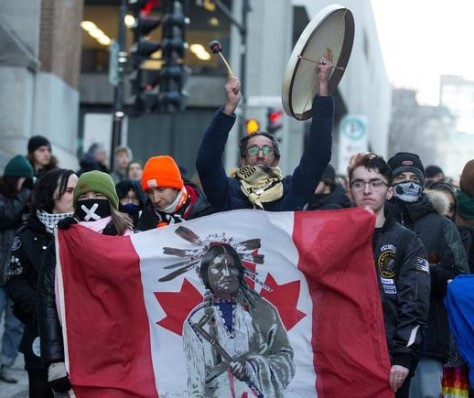TC Energy Corporation Ignores Indigenous Rights in Mexico Project

TC Energy Corporation, a company that operate pipelines and power-generation plants in Canada, the US, and Mexico, announced it will resume construction a day federal and provincial ministers announced a proposed arrangement over the Coastal GasLink pipeline.
The company said it had all the permits required to proceed with the project amind strong opposition from traditional Wet'suwet'en hereditary chiefs.
TC Energy has been a target of accusations for trampling over Indigenous rights in its Coastal GasLink project. Many say their treatment of the Indigenous rights in the Mexico project resembled tactics the company used for their controversial British Columbia project in Canada.
Grand Chief and President of the Union of British Columbia (UBIC) Stewart Phillip said negotiations have failed to resolve the issue of the pipeline. He also said resolution between both parties is looking bleak.
TC Energy's decision to move forward with the project despite opposition fits their pattern of turning a deaf ear to objection from indigenous people.
Indigenous people in the Rosebud Sioux and Fort Belknap are also fighting against the company's Keystone XL pipeline proposal in the United States which leaked over 400,000 gallons of tar sand oil in 2019.
The Nahua, Totonaca, Otomi, and Tepehua tribes in Mexico have also spoken out against TC Energy's plans to construct pipelines on their land. Many from the indigenous communities fought back against the project by putting up legal stays and blockades to prevent the last few lines from being connected.
Wet'suwet'en hereditary chiefs issue eviction notice to pipeline company https://t.co/tP6ESmAlCA via @georgiastraight #wetsuweten @Gidimten @UnistotenCamp #Indigenous @ubcic #coastalgaslink #bcpoli #abpoli #tcenergy @tcenergy @russdiabo #climate @eric_doherty @cinecraig — Charlie Smith (@charliesmithvcr) January 5, 2020
In 2019, TC Energy reported a revenue of over $13 billion, with profits approaching $4 billion, allowing the company to have resources to weather hurdles and storms.
The Mexican government has heavily criticized the company's insensitivity to the concerns of Indigenous people. The government also ordered TC Energy to put a stop on one of their Mexican projects.
Mexican President Andres Manuel Lopez Obrador said he would change or cancel numerous gas projects heralded by TC Energy, especially in places where the projects have caused community conflict.
Obrador also said the contracts were not a good deal for Mexico.
TC Energy has a number of pipeline projects in Mexico---five projects are operational, while two others are still under construction.
The latter pipeline projects---the Tula project and the Villa de Reyes--- were signed by the previous Mexican president.
President Obrador has since promised to be more sensitive to the concerns of those who might be affected by the pipeline project.
Lopez Obrador canceled the Tula line project in January when it reportedly planned to go through land sacred to the Nahua tribe as well as risk damaging an aquifer.
The current administration also promised to do what it can to avoid problems such as environmental issues.
Related: Mexicans Protest Over Latest Infrastructure Projects By Government
A report written by the Mexican Energy Secretariat claimed the Canadian company lacked a proper understanding of the country's legal and cultural environment. It also criticized the company's lack of awareness of Indigenous culture, sacred sites, traditional plants, and medicine.
The company was called out for having poor communication with various government agencies and a lack of action to address the concern surrounding the security of Indigenous women and girls due to the huge number of male workers unknown to the communities.
"There is no question that governments at all levels, as well as energy corporations, tend to believe that Indigenous rights are optional," Grand Chief Stewart Philip said.
TC Energy addressed the concerns in an open letter in 2018, calling them "irrational" and borderline "extortion."
Subscribe to Latin Post!
Sign up for our free newsletter for the Latest coverage!

















